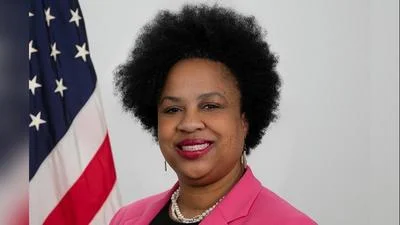Springfield
Springfield
Rep. Peter Breen (R-Lombard) wanted to know why the House was voting on a $16 million program without the budget revenue estimate.
“Why would we pull a line item out when we aren’t even sure how much revenue we got and there is a whole budget process going on?” Breen asked of HB5750 at the May 24 House floor debate. The measure would provide that the School Infrastructure Fund make appropriations to the Illinois State Board of Education for school district broadband expansion.
Breen asked bill sponsor Rep. Natalie Phelps Finnie (D-Elizabethtown) why the House would appropriate for broadband expansion that would become effective July 1 before funding for more school resources officers, children’s health care, cancer treatment or public schools.

Rep. Peter Breen (R-Lombard)
Because you can’t expect children to learn without the internet, answered Finnie, who said she has counties in her district that lack broadband.
“If it is such a great idea then it should go into the budget that is being negotiated right now by the four caucuses and the governor together and done in that manner,” Breen said.
Dealing with an unrelated budget item while bumping up against a third reading deadline for regular bills does not make sense, Breen said.
“Until I see a budget and how this fits into a budget, I don’t think anyone can support this particular line item at this particular amount,” Breen said.
Rep. Jeanne Ives (R-Wheaton) was even more adamant about appropriating money, which she said was simply being put out to gain a 10 percent match of federal funds for 100 special districts that taxpayers will have to pay for statewide. Ives cited annual per-student cost to prove her point, beginning with Joppa Maple-Grove District 38.
“It is actually in the sponsor's district and the average spend per student in that district according to the ISBOE (Illinois State Board of Education) website is $13,163,” Ives said, adding the district spends more per student then in her district.
“In fact, they spend more per student than the average we pay in the student, which is about $12,800,” she added.
Rather than wait for the $350 million in evidence-based school funding to be fully distributed to pay for the measure, Ives said this is just another one-off appropriation.
“This should be part of the budget negotiation,” she added.
While Rep. Mark Batinick (R-Plainfield) and Rep. Keith Wheeler (R-Oswego) both rose to point out that the money the sponsor was seeking was not part of the General Revenue Fund, Rep. Robert Pritchard (R-Hinkley) asked about the urgency.
“This is the last year we can get the federal grant and for that 10 percent matching,” Finnie said, adding education is evolving into technology-based learning rather than textbook based.
Pritchard questioned where some of the 100 districts that would receive the money were located.
“Some are in my district, some are in inner-city Chicago and I know a few other areas in the state,” Finnie said.
Pritchard, who was more open to the idea than Breen and Ives, said if it passed, the bill would connect all statewide schools together.
“This is moving our state forward,” Pritchard said, adding that although evidence-based funding will supplement technology, connectivity is key.
“This bill would help provide that,” Pritchard said.
Despite more than a dozen GOP no votes, HB5750 passed 95-15 and moved to the Senate for debate and vote.
.jpeg)





 Alerts Sign-up
Alerts Sign-up